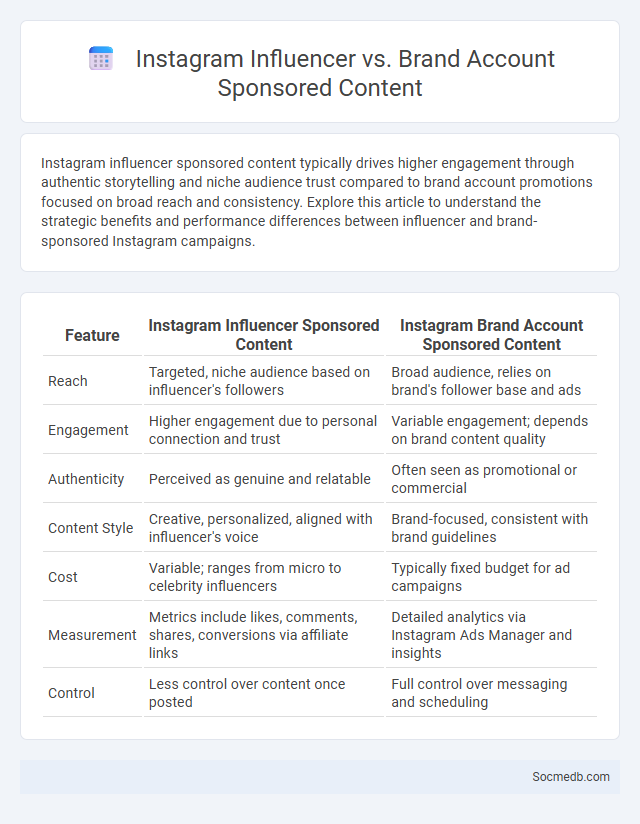
Photo illustration: Instagram Influencer vs Brand Account Sponsored Content
Instagram influencer sponsored content typically drives higher engagement through authentic storytelling and niche audience trust compared to brand account promotions focused on broad reach and consistency. Explore this article to understand the strategic benefits and performance differences between influencer and brand-sponsored Instagram campaigns.
Table of Comparison
| Feature | Instagram Influencer Sponsored Content | Instagram Brand Account Sponsored Content |
|---|---|---|
| Reach | Targeted, niche audience based on influencer's followers | Broad audience, relies on brand's follower base and ads |
| Engagement | Higher engagement due to personal connection and trust | Variable engagement; depends on brand content quality |
| Authenticity | Perceived as genuine and relatable | Often seen as promotional or commercial |
| Content Style | Creative, personalized, aligned with influencer's voice | Brand-focused, consistent with brand guidelines |
| Cost | Variable; ranges from micro to celebrity influencers | Typically fixed budget for ad campaigns |
| Measurement | Metrics include likes, comments, shares, conversions via affiliate links | Detailed analytics via Instagram Ads Manager and insights |
| Control | Less control over content once posted | Full control over messaging and scheduling |
Instagram Influencer vs Brand Account: Key Differences
Instagram influencers build personal brands by creating authentic content that resonates with their niche audience, while brand accounts focus on promoting products or services to drive sales and increase market visibility. Your strategy should leverage influencers' trust and engagement metrics versus brand accounts' controlled messaging and consistent branding efforts. Understanding these differences helps optimize your marketing campaigns for maximum reach and impact.
What is Sponsored Content on Instagram?
Sponsored content on Instagram refers to posts and stories that businesses pay to promote in order to reach a broader audience beyond their organic followers. These advertisements are seamlessly integrated into users' feeds and often feature branded messages, influencer partnerships, or product placements designed to increase engagement and drive conversions. Instagram's advertising platform uses advanced targeting options such as demographics, interests, and behaviors to maximize the relevance and effectiveness of sponsored content campaigns.
Authenticity: Influencers vs Brand Accounts
Authenticity is a critical factor in social media engagement, with influencers often perceived as more genuine due to their personal storytelling and relatable content, contrasting with brand accounts that may appear promotional and scripted. Influencers build trust through consistent, transparent interactions, creating emotional connections that drive audience loyalty and higher engagement rates. Brand accounts can enhance authenticity by incorporating user-generated content and showcasing behind-the-scenes perspectives to foster a sense of community and credibility.
Audience Engagement: Influencer Content vs Brand Content
Audience engagement on social media thrives when influencer content leverages authentic storytelling that resonates with followers, fostering trust and interactive feedback. Brand content often delivers consistent messaging and product highlights but may lack the personalized connection influencers provide, affecting engagement rates. Your strategy should balance both approaches to maximize reach and foster meaningful interactions across diverse audience segments.
Reach and Targeting: Influencers vs Brands
Influencers offer personalized reach by engaging niche communities with authentic content, boosting your brand's visibility among targeted audiences. Brands leverage broader reach through paid campaigns and data-driven targeting strategies, ensuring precise demographic alignment and scalable impressions. Your marketing strategy benefits most from combining the trust influencers build with the analytical power of brand campaigns to maximize reach and conversion.
Trust and Credibility: Influencer Endorsements vs Brand Promotions
Influencer endorsements amplify trust by leveraging authentic connections and perceived expertise, resulting in higher audience engagement and brand credibility. Brand promotions rely on consistent messaging and established reputation, but often face skepticism due to overt commercial intent. Studies show consumers are 70% more likely to trust influencer content over direct brand advertisements, highlighting the effectiveness of influencers in building genuine trust.
Cost Analysis: Influencer Campaigns vs Brand Account Sponsorships
Influencer campaigns typically demand higher upfront costs due to individual endorsement fees, which can range from hundreds to millions of dollars depending on follower count and engagement rates. Brand account sponsorships often involve negotiated prices tied to follower demographics and content reach, sometimes resulting in more predictable and scalable budgets. Analyzing ROI metrics such as engagement rate, conversion ratio, and audience retention helps determine the most cost-effective social media investment strategy.
Content Quality and Creative Control
High-quality content on social media significantly boosts engagement rates and follower loyalty by providing value and authenticity. Maintaining creative control allows you to tailor your messages and visuals to resonate with your target audience, enhancing brand identity and increasing overall reach. Consistently optimizing your content strategy based on analytics ensures your social media presence remains impactful and relevant.
Performance Metrics: Measuring Sponsored Content Success
Performance metrics such as engagement rate, click-through rate (CTR), and conversion rate play a crucial role in measuring the success of sponsored content on social media platforms. Tools like Facebook Insights, Instagram Analytics, and Twitter Analytics provide detailed data on audience reach, impressions, and interactions, enabling marketers to optimize campaigns effectively. Tracking cost per acquisition (CPA) and return on ad spend (ROAS) further refines budget allocation and enhances overall campaign performance.
Choosing the Right Strategy: Influencer or Brand Account Sponsorship
Choosing the right strategy between influencer marketing and brand account sponsorship depends on your target audience and campaign goals. Influencers offer authentic engagement and can amplify your message through trusted voices, while brand account sponsorships provide direct control over messaging and consistent brand representation. Your decision should align with the nature of your products or services and the level of audience interaction you seek.
 socmedb.com
socmedb.com